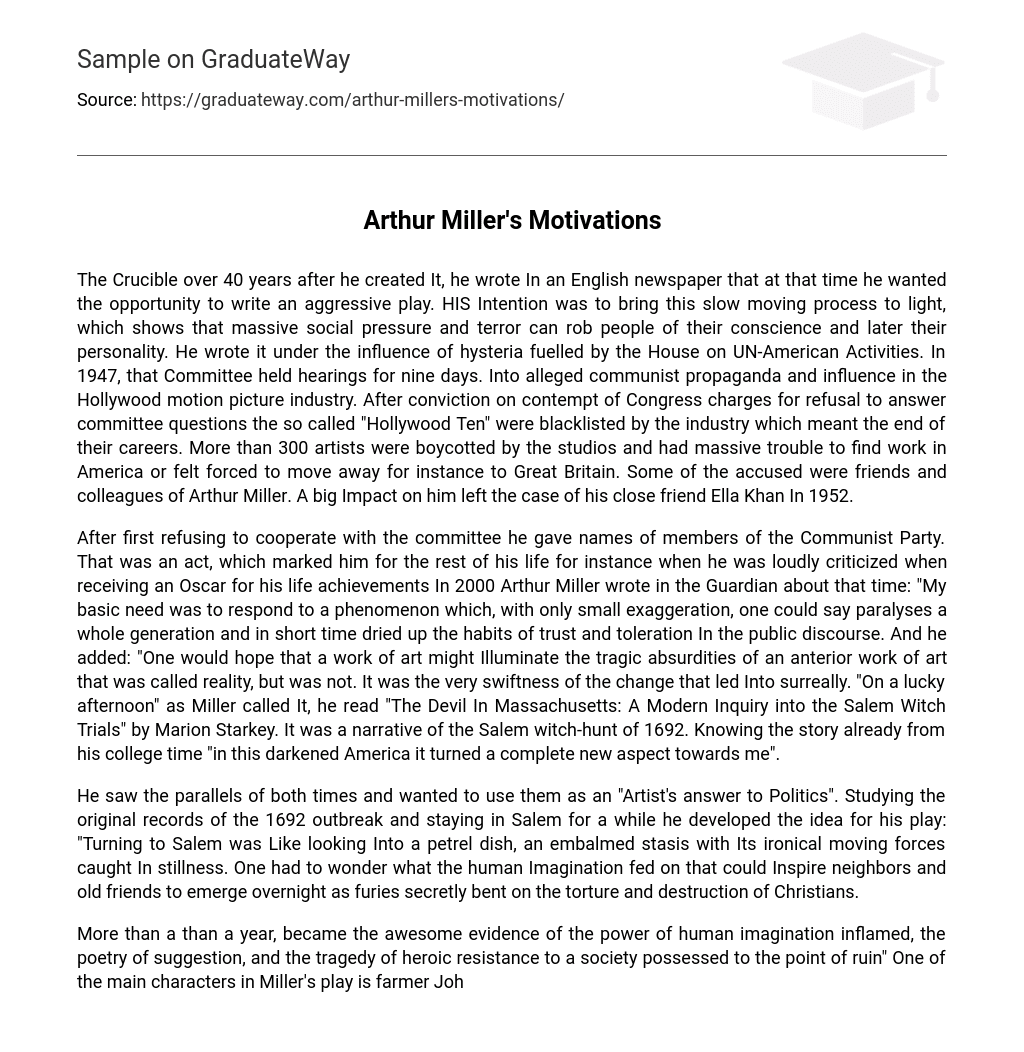The Crucible was created over 40 years ago, and in an English newspaper article, the playwright expressed his desire to write a bold and forceful play. His aim was to shed light on the slow-moving process that reveals the ability of societal pressure and terror to erode people’s conscience and ultimately their identity. This play was written during a time of hysteria fueled by the House on UN-American Activities, which conducted hearings in 1947 to investigate alleged communist propaganda and influence in the Hollywood film industry. The repercussions were severe, as those found guilty of contempt of Congress and who refused to answer committee questions, known as the “Hollywood Ten,” were blacklisted by the industry, effectively ending their careers. Over 300 artists faced boycotts from studios, making it difficult for them to find work in America or leading them to relocate, often to Great Britain. Some of those accused were close friends and colleagues of Arthur Miller. The case of his dear friend Ella Khan in 1952 deeply affected him.
After initially refusing to cooperate with the committee, he eventually revealed the names of Communist Party members. This decision would have a lasting impact on his life, as he faced criticism when receiving an Oscar for his lifetime achievements in 2000. Reflecting on this time, Arthur Miller wrote in the Guardian, “My main goal was to address a phenomenon that could be described as paralyzing an entire generation and rapidly eroding trust and tolerance in public discourse.” He further commented, “One would hope that a work of art could shed light on the tragic absurdities of a previous work of art masquerading as reality.” The suddenness of the societal changes led to surreal experiences. Then, one fortuitous afternoon, Miller came across Marion Starkey’s “The Devil In Massachusetts: A Modern Inquiry into the Salem Witch Trials.” This narrative explored the events of the Salem witch-hunt in 1692. Although already familiar with the story from his college days, Miller found it took on a completely new dimension in this darkened America.
He observed the similarities between the two periods and desired to utilize them as a “Creative response to Politics”. By examining the authentic documents from the 1692 epidemic and residing in Salem for some time, he conceived the concept for his play: “Redirecting attention to Salem felt akin to peering into a petri dish, a preserved state of inertia entangled in paradoxical dormant forces. It prompted contemplation of what thoughts and ideas fueled the human mind, compelling neighbors and longtime companions to suddenly transform into clandestine furies determined to inflict torment and ruin upon Christians.”
More than a year ago, the remarkable evidence of the power of human imagination ignited, the poetry of suggestion, and the tragedy of heroic resistance to a society consumed by destruction,” One of the central figures in Miller’s play is farmer John Proctor. When Miller arrived in Salem, he discovered the true story of John Proctor. This individual’s destiny became the catalyst for Miller’s play. John Proctor, the “sinner,” defied “his debilitating personal guilt and emerged as the most outspoken voice against the insanity surrounding him. This demonstrated to Miller “that a distinct moral protest could still arise even from a seemingly flawless soul.” The play “centered around this man.” Miller did make some alterations to John Proctor’s character. He was not only a farmer but also a tavern keeper. Miller likely changed this detail to solely portray him as a farmer because it aligns with the common perception that farmers are grounded, independent, honest, hardworking, and straightforward. This portrayal was Miller’s intention for his rendition of John Proctor.
The play is enhanced by John Proctor’s character, as he adds dramatic tension and prevents it from being a mere documentary about the Salem witch trials. He not only challenges authority but also saves his friends, making him the main protagonist and an indispensable part of the story. Abigail initiates the events, but her actions are amplified by Proctor’s involvement. The hypocrisy and deceitful teachings of Salem’s Christian community become apparent to me. Before her affair with Proctor, Abigail probably wouldn’t have behaved in such a way. In Act Four, Rebecca Nurse warns Proctor that there will be another judgment for all of them. If this is indeed true and only God has the right to judge, then why didn’t Proctor just lie? After all, God knows everything and would be aware that he lied to protect his children. Choosing to die at that point would likely condemn him to Hell.
He ploughed on Sundays, didn’t baptize one of his children, committed lechery, and didn’t confess even when he had the opportunity to save his friends. His chances would have been much greater if he had simply signed his name and fully embraced Christianity for the rest of his life. John Proctor provides the play with a story and gives the audience someone to relate to, as he is flawed but still strives to improve things. Miller wanted us to recognize this potential within all of us. When it was eventually his turn to be questioned by the committee, he behaved differently from his friend Khan, who refused to provide information.





